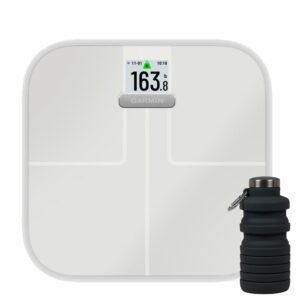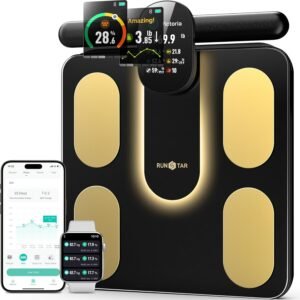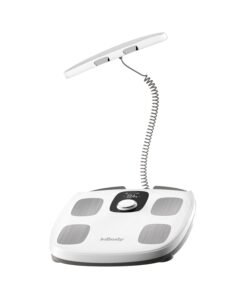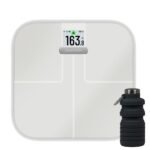Best Smart Scales 2025 for Accurate Body Tracking at Home
Tracking your health has never been more important, and that’s why the best smart scales 2025 for accurate body tracking at home are gaining huge popularity. These advanced devices go beyond just showing your weight—they provide detailed body composition metrics that help you understand your health better and make smarter fitness decisions.
Accurate body tracking is crucial for anyone committed to improving their health or fitness levels. Whether you are trying to lose weight, build muscle, or simply maintain a healthy lifestyle, knowing your body’s composition—like body fat percentage, muscle mass, and BMI—gives you a clearer picture than weight alone. This is where smart scales become essential. Unlike traditional scales, the best smart scales offer precise and comprehensive measurements that sync seamlessly with health apps on your smartphone.
In 2025, smart scales come equipped with cutting-edge features such as Bluetooth and Wi-Fi connectivity, multi-user profiles, and compatibility with popular health tracking platforms like Apple Health, Google Fit, and Fitbit. This makes them not only accurate but also extremely convenient for everyday use at home. The growing demand for these devices highlights how important home health monitoring has become, allowing users to keep close tabs on their progress and adjust their routines accordingly.
In this post, you will learn all about the best smart scales that provide accurate body tracking right in the comfort of your home. We’ll explore what makes a smart scale accurate, key features to look for when choosing one, and review the top smart scales of 2025. Additionally, we’ll share practical tips on how to use these devices to get the most reliable readings possible.

Track your body metrics with Garmin Index S2 Smart Scale and stay hydrated on the go with the collapsible Deco Essentials 24oz water bottle.
What Is a Smart Scale? Best Smart Scales 2025
A smart scale is an advanced digital device designed not only to measure your weight but also to provide a comprehensive analysis of your body composition. Unlike traditional bathroom scales that only show your weight, smart scales use built-in sensors and technology to track a variety of health metrics, making them essential tools for anyone interested in accurate body tracking at home.
Key Features of Best Smart Scales 2025
Smart scales come equipped with features that go beyond basic weight measurement. They typically connect to smartphones or other devices via Bluetooth or Wi-Fi, allowing you to sync your data with fitness apps such as Apple Health, Google Fit, or Fitbit. Many smart scales support multiple user profiles, which means different family members can track their progress individually.
These scales often feature sleek, modern designs with clear digital displays. They use bioelectrical impedance analysis (BIA) technology to estimate various body composition metrics, giving users a deeper understanding of their health.
How Smart Scales Differ from Traditional Scales : Best smart scales 2025 for accurate body
The main difference between smart scales and traditional scales lies in the type and amount of data provided. While traditional scales only display your weight, smart scales analyze multiple health indicators, offering a more complete picture of your fitness and wellness. Additionally, traditional scales require manual tracking of your weight over time, whereas smart scales automate data collection and storage, making it easier to monitor trends and progress through companion apps.
Common Body Metrics Tracked by Smart Scales Visit Fiverr and More learn

Track your health with precision using the Runstar Smart Scale — 28 body metrics including fat, BMI, muscle, and more. FSA/HSA eligible.
Most smart scales track the following key metrics to provide a thorough body analysis:
- Weight: The basic measurement every scale provides.
- Body Mass Index (BMI): A ratio of weight to height used to estimate if your weight is in a healthy range.
- Body Fat Percentage: The proportion of fat in your body compared to lean mass.
Muscle Mass: The weight of muscle in your body, important for fitness and metabolism.

Monitor your health with medical-grade accuracy using the InBody Dial H30 — smart scale with BMI, fat, and muscle tracking. FSA/HSA eligible.
- Bone Mass: An estimate of the weight of bone mineral in your body.

Support your joints, skin, and oral health naturally with 3000mg of grass-fed beef bone and marrow – a whole-body wellness formula.
- Hydration Levels: Measures the amount of water in your body, critical for overall health.
- Visceral Fat: Fat stored around internal organs, which impacts health risks.
These metrics allow users to make better-informed decisions about diet, exercise, and lifestyle, helping them achieve and maintain their health goals.
Why Accuracy Matters in Best Smart Scales 2025
When choosing the best smart scales 2025 for accurate body tracking at home, one crucial factor to consider is accuracy. Accurate measurements are essential because they directly impact how effectively you can monitor your health and track your progress over time.
Impact of Accurate Measurements on Health Monitoring
Accurate body metrics help users make informed decisions about their fitness routines, diet plans, and overall health management. Inaccurate readings can lead to misunderstandings about your body’s condition, causing frustration or even wrong health choices. For example, if your body fat percentage or muscle mass data is off, you might misjudge whether your current workout or nutrition plan is effective. Therefore, precision in smart scales ensures that the data you rely on truly reflects your body’s status.
Factors Affecting Accuracy : Best smart scales 2025 for accurate body
Several factors influence how accurate a smart scale can be:
- Technology: The use of advanced sensors and bioelectrical impedance analysis (BIA) is vital. More sophisticated sensors provide finer measurements and more reliable results.
- Calibration: Proper factory calibration and regular recalibration are necessary to maintain accuracy over time. Some scales self-calibrate to keep measurements consistent.
- User Factors: Variations like hydration level, time of day, and even foot placement can affect readings. The best smart scales minimize these influences with smart algorithms.
- Build Quality: High-quality materials and stable platforms ensure better sensor performance and reduce measurement errors.
Benefits of Reliable Data for Users Best Smart Scales 2025
Reliable data from accurate smart scales gives users confidence in their health monitoring. It allows them to track subtle changes in body composition that weight alone cannot reveal. With trustworthy measurements, you can set realistic fitness goals, monitor fat loss or muscle gain effectively, and detect early signs of health issues. This makes smart bathroom scales not only convenient but also powerful tools for long-term wellness management.
In summary, accuracy is the foundation of effective body tracking, and investing in the best smart scales 2025 ensures you get consistent, dependable insights to support your health journey at home.
Top Features to Look for in a Smart Scale in 2025
Choosing the best smart scales 2025 for accurate body tracking at home means paying close attention to the features that enhance usability, accuracy, and convenience. Here are the key features you should consider when selecting a smart scale:
Connectivity Options: Bluetooth and Wi-Fi Best Smart Scales 2025
Modern smart scales offer either Bluetooth or Wi-Fi connectivity, or sometimes both. Bluetooth is great for quick, direct syncing with your smartphone, while Wi-Fi enables automatic syncing in the background without needing your phone nearby. A scale with reliable connectivity ensures your data is updated seamlessly to your fitness apps for continuous health tracking.
Compatibility with Health Apps : Best smart scales 2025 for accurate body
One of the most important features is compatibility with popular health platforms such as Apple Health, Google Fit, Fitbit, and others. This integration allows your smart scale to sync body metrics effortlessly, consolidating all your health data in one place. This makes it easier to analyze trends and combine scale data with other fitness activities.
Multiple User Profiles and Data Storage
If multiple people in your household want to track their body composition, look for smart scales that support multiple user profiles. This feature lets the scale recognize different users and store individual data separately. Data storage on companion apps or cloud services is also vital for reviewing long-term progress and sharing reports with healthcare providers or trainers.
Design, Display, and Ease of Use Best Smart Scales 2025
A smart scale should be easy to use and visually appealing. Look for a design that fits well in your bathroom or bedroom, with a clear, bright display that shows readings instantly. Some smart scales offer touchscreens, LED backlighting, or voice feedback for added convenience. Non-slip surfaces and sturdy build quality contribute to safe and reliable use.
Price vs. Features Balance : Best smart scales 2025 for accurate body
Finally, consider your budget. The best smart scales 2025 offer a good balance between cost and features. Higher-end models may provide more advanced metrics and better app integration, but there are also affordable options with essential features that deliver accurate tracking. Assess your needs and choose a scale that offers the most value without overspending.
By focusing on these features, you can select a smart scale that fits your lifestyle and delivers the accuracy needed for effective body tracking at home.
Review of the Best Smart Scales for Accurate Body Tracking at Home
Here’s a detailed review of some of the best smart scales 2025 for accurate body tracking at home, highlighting their features, pros, cons, and pricing to help you make an informed decision.
Model 1: Withings Body+ Smart Scale Best Smart Scales 2025
Features: Best smart scales 2025 for accurate body
- Measures weight, body fat, muscle mass, water percentage, and bone mass
- Wi-Fi and Bluetooth connectivity
- Syncs with Apple Health, Google Fit, and Fitbit
- Multiple user profiles supported
- Pregnancy tracking mode available
Pros: Best Smart Scales 2025
- Accurate and reliable measurements
- Easy to use with a clear display
- Seamless app integration
- Great design and build quality
Cons: Best smart scales 2025 for accurate body
- Slightly higher price point
- Requires Wi-Fi for full functionality
Pricing: Around $100 – $130
Model 2: Eufy Smart Scale P1
Features: Best Smart Scales 2025
- Tracks 14 body metrics including BMI, body fat, muscle mass, and hydration
- Bluetooth connectivity
- Compatible with Apple Health, Google Fit, and Fitbit
- Supports up to 16 user profiles
- Affordable pricing
Pros: Best smart scales 2025 for accurate body
- Offers extensive body metrics
- User-friendly app and interface
- Good value for money
Cons: Best Smart Scales 2025
- No Wi-Fi support
- Somewhat bulky design
Pricing: Around $50 – $70
Model 3: Fitbit Aria Air : Best smart scales 2025 for accurate body
Features: Best Smart Scales 2025
- Measures weight and BMI
- Bluetooth connectivity
- Syncs with Fitbit app and other health apps
- Simple, minimalistic design
Pros: Best smart scales 2025 for accurate body
- Affordable Fitbit ecosystem entry point
- Easy to set up and use
- Good for basic weight and BMI tracking
Cons: Best Smart Scales 2025
- Limited body composition metrics
- No Wi-Fi connectivity
Pricing: Around $50
Model 4: Garmin Index S2
Features: Best smart scales 2025 for accurate body
- Tracks weight, body fat, muscle mass, bone mass, BMI, and water percentage
- Wi-Fi and Bluetooth connectivity
- Syncs with Garmin Connect and other apps
- Supports up to 16 users
- Large, colorful display
Pros: Best Smart Scales 2025
- Very accurate and detailed metrics
- Strong app ecosystem with fitness tracking
- Multiple connectivity options
Cons: Best smart scales 2025 for accurate body
- Higher price
- Slightly complex setup for beginners
Pricing: Around $150 – $180
Comparison Table of Best Smart Scales 2025
| Model | Metrics Tracked | Connectivity | User Profiles | Price Range | Pros | Cons |
| Withings Body+ | Weight, fat, muscle, water, bone | Wi-Fi & Bluetooth | Multiple | $100 – $130 | Accurate, app integration | Higher price, needs Wi-Fi |
| Eufy Smart Scale P1 | 14 body metrics | Bluetooth | Up to 16 | $50 – $70 | Affordable, many metrics | No Wi-Fi, bulky design |
| Fitbit Aria Air | Weight, BMI | Bluetooth | Multiple | ~$50 | Easy to use, Fitbit ecosystem | Limited metrics, no Wi-Fi |
| Garmin Index S2 | Weight, fat, muscle, bone, BMI | Wi-Fi & Bluetooth | Up to 16 | $150 – $180 | Detailed metrics, strong app | Expensive, complex setup |
How to Choose the Right Smart Scale for You
Selecting the best smart scale for your needs requires careful consideration of several factors:
Consider Your Health Goals : Best smart scales 2025 for accurate body
Before buying, think about what body metrics matter most to you. Are you focused mainly on weight tracking, or do you want detailed body composition data like body fat percentage, muscle mass, or hydration levels? Different smart scales offer varying levels of detail, so pick one that aligns with your fitness or health goals.
Budget Considerations : Best smart scales 2025 for accurate body
Device Compatibility and App Ecosystem
Make sure the smart scale you choose is compatible with the devices and health apps you use daily, such as Apple Health, Google Fit, Fitbit, or Garmin Connect. Seamless syncing helps you track progress over time and integrate scale data with other fitness activities.
User Reviews and Brand Reputation Best Smart Scales 2025
Research user reviews to understand real-world performance and reliability. Established brands with good reputations usually offer better customer support, firmware updates, and overall quality assurance. Don’t just rely on marketing—check what users say about accuracy and durability.
Tips for Getting the Most Accurate Readings : Best Smart Scales 2025
Once you have your smart scale, following these tips can help ensure precise and consistent measurements:
Proper Placement and Usage Best Smart Scales 2025
Place your smart scale on a flat, hard surface such as tile or hardwood floors. Avoid carpets or uneven surfaces as they can skew readings. Step onto the scale barefoot, standing still and balanced for a few seconds until the measurement stabilizes.
How Often to Calibrate or Reset : Best smart scales 2025 for accurate body
Some smart scales require occasional calibration or resetting to maintain accuracy. Refer to your scale’s manual for instructions on calibration frequency and procedure. Regular calibration helps counter sensor drift or environmental changes.
Environmental Factors to Avoid : Best smart scales 2025 for accurate body
Avoid taking measurements immediately after exercise or eating, as hydration and body fluid changes can affect results. Also, keep the scale away from moisture, extreme temperatures, and direct sunlight, as these conditions may interfere with sensor performance.
Conclusion : Best smart scales 2025 for accurate body
Don’t forget to check the latest prices, read user reviews, and choose a model that offers the features you need. Start your journey to better health today by investing in a smart scale that works for you!
Frequently Asked Questions (FAQ) : Best smart scales 2025 for accurate body
- What is the difference between a smart scale and a regular scale?
A smart scale measures additional body metrics such as body fat percentage, muscle mass, and BMI, and connects to apps via Bluetooth or Wi-Fi to track your data over time. Regular scales only measure weight. - How accurate are smart scales for body composition?
Smart scales use bioelectrical impedance analysis, which is fairly accurate for home use but can vary based on hydration, time of day, and user conditions. For best accuracy, follow manufacturer guidelines and measure consistently. - Can multiple users use the same smart scale? Best Smart Scales 2025
Yes, most smart scales support multiple user profiles, allowing each person to track their individual data separately through the connected app. - Do smart scales work without Wi-Fi? Best smart scales 2025 for accurate body
Many smart scales offer Bluetooth connectivity and can sync data via your smartphone without Wi-Fi. However, some features and automatic syncing may require a Wi-Fi connection. - How often should I use my smart scale for best results?
For consistent tracking, daily or weekly measurements at the same time of day (preferably in the morning) are recommended. Avoid measuring after heavy meals or exercise for more stable readings.










